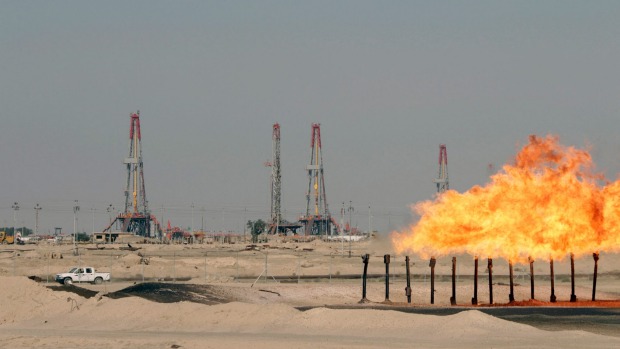
Excess gas is burnt off at a pipeline at Rumaila oilfield in Basra, southeast of Baghdad January 12, 2015.- Reuters
Members of the Organization of the Petroleum Exporting Countries and producers (OPEC) and non-OPEC producers should act promptly to rebalance the global oil market, otherwise the damage may deepen and take a long time to be fixed, a senior Iraqi oil official said on Wednesday.
Saudi Arabia, Russia, Venezuela and Qatar agreed in a surprise meeting last week to freeze production at January levels in an attempt to balance the market and boost oil prices that plunged some 70 percent in the last 20 months.
Iraq showed its willingness to cooperate but gave no details on whether it would freeze its production.
Iran, which is the major stumbling block to reaching a global deal by focusing on ramping up output after the lifting of sanctions, has said the freeze proposal places “unrealistic demands” on it.
“OPEC has [been] recently focusing on market share rather than defending the price and this gave the organization the big role in reshaping the structure of the global oil and gas industry,” Faleh al-Amri said at the Argus Middle East Crude Conference in Abu Dhabi.
Falah Alamri, Iraq’s OPEC governor and head of the State Oil Marketing Organization (SOMO), did not specify whether Iraq would join other oil producers in the freeze deal ; however, he pointed out that any change in the country’s output plans has to be done jointly with international oil companies who develop its main oil fields.
“OPEC and non-OPEC countries should act promptly to rebalance world oil supply and demand or the damage could be deeper and take time to recover,” Alamri said.
He said the collapse and volatility in oil prices were not associated with Iraq’s oil production, which has been increasing at a steady pace each year consistently with the global demand, and would continue to do so.
“Steady moderate yearly increases in Iraq oil production have been in line with the global oil demand,” he said.
“Iraq does not want to flood the market,” Alamri said, adding that the country is still planning to ramp up its production to 6 million barrels a day by 2020 but will do it steadily.
Iraq’s oil production was 4.775 million barrels per day last month and the OPEC member currently exports nearly 4 million barrels a day including shipments from the northern Kurdish region, he said.
“At the end of the day we don’t want to flood the market with oil, we have to take into consideration the yearly demand. It will be a sustainable development but there will be no jump, it will not be affecting the international market,” he said.
“Iraq will try to maintain its crude oil market share in Asia, Europe, Americas and other markets.”
